Keyword search: 177 records shown
| Course categorySort by Course category Ascending | Course nameSort by Course name Ascending | Course summarySort by Course summary Ascending Ascending | New CourseSort by New Course Ascending |
|---|---|---|---|
| Expired | The Young Eye: Development of Vision, Part 1 - Birth to three years (Non-interactive) | This course expired on 30 April 2025. If you have completed this course, you can print your certificate here.This course has been replaced with our The Young Eye: Development of Vision, Part 1 course, reissued in April 2025. | No |
| Expired | Safeguarding Adults for Optometrists Level 2 (Certificates achieved - 20/01/25 to 05/12/25) | This accredited Level 2 e-learning Safeguarding course expired on 5 December 2025. If you have completed this course, you can print your certificate here.This course has been replaced with our new updated Safeguarding Adults for Optometrists Level 2 course, issued in December 2025. | No |
| Video library | The Ageing Eye: Adapting the Routine - Community practice | 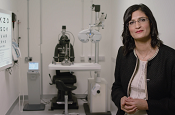 No CPD Points
In this programme, experts look at how to adapt the routine eye check when examining elderly patients including communication, ocular examination and refraction. It provides guidance on techniques to use and how best to modify an examination to ensure that elderly patients get the highest level of care and their individual needs are addressed. Topics: Communication, Ocular examination, Refraction, Binocular vision, Charts, Pupils, Visual fields, Legal, Visual assessment, Retinoscopy, Ophthalmoscopy, LogMAR, Contrast sensitivity, Lighting. | No |
| Video library | Ocular Surface and Anterior Chamber Lesions in Daily Practice (May 2021 Webinar) | 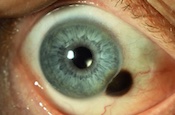 No CPD Points Domains: Clinical practice, Communication
This recorded lecture by consultant ophthalmic surgeon, Professor Heinrich Heimann provides an overview of the most important malignancies and pre-malignancies of the ocular surface and anterior chamber and how to spot them. Topics: Melanoma, Lymphoma, Naevus, Tumour, Conjunctiva, Ciliary body, Iris, Anterior chamber, Pigment, Cyst, Metastisis, Papilloma, Squamous cell. | No |
| CPD courses | Binocular Vision: Beyond the prism (November 2021 Webinar) (Updated 2025) | 
CPD Points: CPD Type: Non-interactive Closing Date: 31 December 2026 Domains: Communication, Clinical practice
This recorded lecture by Dr Aleksandra Mankowska explores four case studies involving patients with binocular vision problems. Each case includes a discussion of presenting symptoms, appropriate clinical assessments and management strategies, offering optometrists practical insights into the diagnosis and treatment of common binocular vision issues. Topics: Paediatric, Multiple sclerosis, Convergence insufficiency, Esophoria, Exophoria, Prism, Fusional reserves, Stereopsis, Cycloplegic, Tropia, Microtropia, Convergence weakness, Refraction, Amblyopia, Nystagmus. | No |
| CPD courses | Common Corneal Conditions: What every optometrist needs to know! (October 2024 Webinar) | 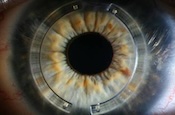 CPD Ref: C-110271 CPD Points: CPD Type: Non-interactive Closing Date: 31 March 2026 Domains: Clinical Practice, Communication
In this recorded lecture, Professor Sai Kolli, consultant ophthalmic surgeon, looks at corneal dystrophies that appear commonly in practice. He discusses which patients are appropriate for monitoring or management in the community, which need to be referred, and the impact of these conditions when referring patients for surgical treatment. Conditions such as keratoconus and Fuchs endothelial corneal dystrophy are also covered. Topics: Referrals, Keratoconus, Fuchs, Endothelium, Recurrent corneal erosion, Tomography, Topography, OCT, Astigmatism, Specular microscopy, Cross-linking, Graft. | No |
| Video library | The CLEAR way to maximise success with contact lenses (March 2022 Webinar) | 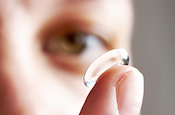 No CPD Points Domains: Communication, Clinical practice
This recorded webinar with Mr Neil Retallic presents key findings from recent contact lens research published in the BCLA Contact Lens Evidence Based Academic Reports (CLEAR) and discusses how it can help shape contact lens practice. The presentation provides clinical pearls on how to best relate to contact lens wearer’s individual needs and take a patient centric evidence-based approach, to maximise success with contact lens wear. Topics: Soft, RGP multifocal, Presbyopia, Fitting, Aftercare, Evidence-based, CLD, Complications, BCLA, Toric. | No |
| CPD courses | Dementia and Optometry: Research and practice (November 2024 Webinar) |  CPD Ref: C-110444 CPD Points: CPD Type: Non-interactive Closing Date: 31 March 2026 Domains: Clinical Practice, Communication
In this recorded lecture, Dr Rakhee Shah presents the latest research on dementia and its implications for optometry. Mr Simon Raw provides clinical insights on tailoring eye examinations to meet the needs of patients with dementia, along with strategies to ensure they feel safe and comfortable. Topics: Mental Capacity Act 2005, Falls, Visual assessment and examination, Referral, Communication, History and symptoms, Dispensing, Dementia. | No |
| CPD courses | Joining the Dots (and Blots) of Diabetic Retinopathy (May 2025 Webinar) | 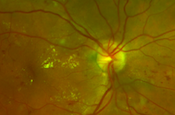 CPD Ref: C-112573 CPD Points: CPD Type: Non-interactive Closing Date: 31 March 2026 Domains: Clinical Practice, Communication
In this recorded webinar, Dr Rosalind Creer, lead optometrist at Manchester Royal Eye Hospital, discusses the signs and symptoms of diabetic retinopathy. She provides an overview of the diabetic eye-screening programme, including recent updates. The lecture also covers referral pathways, treatment options, and key indicators for initiating treatment. Topics: Diabetes, Diabetic retinopathy, Diabetic maculopathy, Diabetic retinal screening programme, HbA1c, Panretinal photocoagulation, Anti-vegf treatment, Diabetic eye disease. | No |
| Video library | Common Eyelid Lesions (September 2022 Webinar) |  No CPD Points Domains: Clinical practice
This recorded webinar, hosted by Consultant Ophthalmic Surgeon Raman Malhotra, will help optometrists to identify and manage commonly occurring suspicious eyelid conditions. It will cover both benign and malignant eyelid lesions as well as discuss the features, diagnosis, management and referral of the conditions by community optometrists. At the end of the webinar, Mr Malhotra answers questions raised during the lecture. Topics: Lids, Malignant, Benign, BCC, Carcinoma, Oncology, Meibomian, Tumour, Squamous cell, Melanoma, Chalazion, Molluscum, Naevus, Papilloma, Xanthelasma. | No |
| CPD courses | Leadership is not hierarchical: Learning from OCCS complaints (April 2024 Webinar) |  CPD Ref: C-108782 CPD Points: CPD Type: Non-interactive Closing Date: 31 March 2026 Domains: Leadership & Accountability
In this recorded lecture, Richard Edwards, clinical consultant to the Optical Consumer Complaints Service (OCCS), reminds delegates of the leadership role they need to take in practice in order to be more accountable for safe clinical care. Based around three case studies, this session aims to equip optometrists with a greater understanding of the evolving regulatory landscape, enabling them to manage patient concerns and complaints effectively. Topics: Record keeping, GDPR, Consent, Professionalism. | No |
| CPD courses | Glaucoma - The optic disc challenge (June 2023 Webinar) (Updated 2026) | 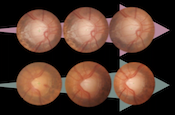 CPD Ref: C-114598 CPD Points: CPD Type: Non-interactive Closing Date: 31 December 2026 Domains: Clinical practice
In this recorded lecture, led by Mr Paddy Gunn, optometrists are given an opportunity to assess and reflect on their optic disc interpretation skills for a range of patient cases. The cases review the key elements to look out for when examining the optic disc, other information to consider and how to use technology, such as OCT, to effectively support the management of glaucoma suspects. Topics: Visual fields, Tonometry, Glaucoma, OCT, IOP, Normal tension, Ocular hypertension, Optic pit, Optic nerve, RNFL. | No |
| CPD courses | PAC, PACS, and PACS+ in Focus: A guide for optometrists (March 2025 Webinar) |  CPD Ref: C-111770 CPD Points: CPD Type: Non-interactive Closing Date: 31 March 2026 Domains: Clinical Practice, Professionalism
In 2022, the Royal College of Ophthalmologists updated guidelines on angle closure disease. In this recorded webinar, Consultant Ophthalmic Surgeon Ms Nishani Amerasinghe provides an overview of PAC, PACS, and PACS+, covering risk assessment, symptom recognition, examination techniques, and appropriate patient management. Topics: Anterior chamber angle, Van Herick, OCT, Gonioscopy, Referral, Glaucoma: Part 1, Management, Treatment. | No |
| Video library | Retinal and Choroidal Lesions in Daily Practice (October 2020 Webinar) |  No CPD Points Domains: Clinical practice, Communication
This lecture by consultant ophthalmic surgeon, Professor Heinrich Heimann, will improve optometrists’ skills in differentiating between benign and suspicious fundus lesions that require monitoring or referral. It focuses on the more common causes including choroidal naevus, choroidal melanoma and CHRPE and includes imaging, referral and monitoring strategies. Topics: Fundus, Retina, Pigmented, Malignant, Tumour, Choroidal, Melanoma, Naevi, CHRPE, Vortex vein ampulla, Peripheral disciform, OCT, Referral, Oncology. | No |
| Video library | Acute Red Eye in Contact Lens Wearers (October 2019 Webinar) | 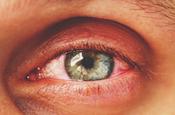 No CPD Points Domains: Clinical practice, Professionalism
This lecture, by consultant ophthalmologist Damian Lake, covers different acute red eye conditions particularly in contact lens wearers. It discusses the management of both those that can be treated in practice, and others, such as infective causes, where urgent referral to the Hospital Eye Service is required. Topics: Contact lenses, Ulcers, Microbial keratitis, Ocular allergy, Viral, Bacterial, Fungal, Allergic, Infiltrate, Hygiene, Infection, Acanthamoeba, Abrasion. | No |
| Video library | Effective Remote Patient Consultations (June 2020 Webinar) |  No CPD Points Domains: Communication, Leadership & Accountability
This filmed lecture, which initially took place as a webinar during the Covid 19 pandemic, will increase your confidence in examining patients remotely, ensuring they are managed safely and referred when required. Topics: Red eye, Record keeping, Triage, Referral, Acute presentation, Ocular disease, Reduced vision, Virtual. | No |
| CPD courses | Assessing children with special educational needs (January 2024 Webinar) |  CPD Ref: C-107759 CPD Points: CPD Type: Non-interactive Closing Date: 31 March 2026 Domains: Clinical practice, Communication
This recorded lecture aims to build the confidence of community optometrists when examining children with special educational needs (SEN). Professor Rachel Pilling provides guidance on adapting your communication and testing approaches to better accommodate children with special needs. Common ocular issues seen in SEN children are addressed, as are the ways in which optometrists can assist both the children and their parents in optimising vision. Recognising when referral is required is also explored. Topics: Special educational needs, SEN, ASD, ADHD, Cerebral visual impairment, CVI, Atypical visual behaviour, Communication, Retinoscopy, Visual assessment, Refraction, GOS, Dry eye, Referral. | No |
| Audio – Clinical assessment | Sound Optometry: Episode 11 - Myopia Management: Active not passive | No CPD Points Domains: Clinical practice, Professionalism
In this episode, we hear from both parent and child as they share their experiences with myopia management using soft contact lenses. Michelle Hanratty then speaks with optometrist Kathryn Webber about best practices in myopia management. Together, they discuss how to identify suitable candidates and offer practical advice on how to communicate the potential benefits of myopia management to patients and their families. Topics: Myopia management, Risk factors for myopia, Communication, Fitting contact lenses in children, Pathological myopia. | No |
| Video library | Interpretation of Visual Fields: What to do when it is not glaucoma (November 2022 Webinar) |  No CPD Points Domains: Clinical practice
In this recorded lecture, Dr Lindsay Rountree explores non-glaucomatous visual fields, covering the choice of test, interpretation of field plots, and appropriate referral. At the end of the lecture, Dr Rountree answers questions raised during her talk. Topics: Neurological, Threshold, Visual pathway, Hemianopia, Quadranopia, Pituitary, Tumour, Stroke. | No |
| CPD courses | Vitreomacular Interface Disorders for Optometrists (November 2025 Webinar) | 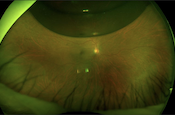 CPD Ref: C-114865 CPD Points: CPD Type: Non-interactive Closing Date: 31 December 2026 Domains: Clinical Practice, Communication
In this recorded webinar, Mr Kam Balaggan provides optometrists with an overview of vitreomacular conditions commonly encountered in clinical practice. This presentation reviews the pathologies you most likely come across, discusses investigations and differential diagnosis and offers guidance on appropriate referrals. It also includes a video of a real patient undergoing cataract and ERM surgery. Topics: VMT, Pseudoholes, Lamellar holes, ERM, AMD, OCT, Referral, Management, Treatment, Cataract, Surgery, Macular. | Yes |
| Video library | Leadership: Are all optometrists clinical leaders? (March 2023 Webinar) |  No CPD Points Domains: Leadership and accountability
In this recorded lecture, an expert panel lead by Philippa Shaw explores the leadership role that all optometrists need to take in community practice and how they may influence colleagues in their team. The panel discusses common situations that occur in everyday practice, as well as optometrists’ responsibilities. Topics: Referrals, Multi-disciplinary, Governance, Records, Delegated tasks, Pre-screening, Audit, Supervision. | No |
| Audio – Ocular disease and management | Sound Optometry: Episode 48 - PACS: Management of primary angle closure suspects |
Domains: Clinical Practice, Communication
This episode is a follow-up to the Docet webinar PAC, PACS, and PACS+ in Focus. Michelle is joined by consultant ophthalmic surgeon Nishani Amerasinghe, and together they recap the essential takeaways for optometrists, including key insights into primary angle closure disease and potential treatment options, as well as long-term patient management within community practice. Topics: Primary Angle Closure (PAC), Anterior angle assessment, Glaucoma, Risk factors for PAC, Referrals, Communication, Management in primary care. | No |
| Audio – Professional matters | Sound Optometry: Episode 47 - Chronic Stress: The brain-body connection |
Domains: Professionalism, Leadership & Accountability
This episode explores the systemic and neurological effects of chronic stress, highlighting its long-term impact on health. Experts discuss the body’s response to stress, its influence on brain function and behaviour, and strategies to protect mental well-being in healthcare professionals. Topics: Stress, Anxiety, Wellbeing, Mental health, Brain health, Cortisol, Hormones, Depression, Inflammation, Dementia. | No |
| CPD courses | Sound Optometry: Episode 53 - Periorbital skin disorders: What’s an optometrist to do? |
CPD Points: CPD Type: Non-interactive Closing Date: 31 March 2026 Domains: Clinical Practice, Specialty CPD (IP)
Around half of the UK population experiences a skin condition each year, and optometrists often encounter ocular or periocular effects of conditions such as eczema and rosacea. In this episode of Sound Optometry, dermatologist Dr Bryan Murphy discusses common skin conditions seen in community practice and advises when optometrists can manage them or should refer. Topics: Atopy, Eczema, Dermatitis, Psoriasis, Allergies, Benign lesions, Malignant lesions, Auto-immune disease, Prescribing, Topical steroids. | No |
| CPD courses | Sound Optometry: Episode 50 - Diabetic retinopathy: Dots and blots of significance |
CPD Points: CPD Type: Non-interactive Closing Date: 31 March 2026 Domains: Clinical Practice, Communication
This episode builds on Dr Rosalind Creer’s Docet webinar Joining the dots (and blots) of diabetic retinopathy, addressing attendee questions and exploring the more subtle characteristics of the condition that can cause management dilemmas. Dr Creer also discusses recent updates to the Diabetic Eye Screening Programme, including community-based monitoring, referral guidelines and available treatments. Topics: Diabetes, Diabetic retinopathy, Diabetic maculopathy, Diabetic Eye Screening Programme, Retinal grading, Diabetic retinopathy treatments, Communication, Referrals. | No |
| CPD courses | Sound Optometry: Episode 52 - Brain Tumours, Part 2: Red flags for referral |
CPD Points: CPD Type: Non-interactive Closing Date: 31 March 2026 Domains: Communication, Clinical Practice
Building on Episode 51’s discussion of brain tumours, this episode features optometrist Lorcan Butler from the Brain Tumour Charity, who explains how he helps eyecare practitioners recognise suspicious neuro-ophthalmological signs and symptoms. Topics: Brain tumours, Neuro-ophthalmology, Idiopathic intracranial hypertension, Papilloedema, Optic disc drusen, Optic disc, Communication, Referrals, Breaking bad news. | No |
| CPD courses | Sound Optometry: Episode 54 - Headaches: Causes and clinical management |
CPD Points: CPD Type: Non-interactive Closing Date: 31 March 2026 Domains: Clinical Practice, Communication
Headache disorders affect around 40% of the global population yet remain widely underrecognised and undertreated, with many patients not receiving appropriate diagnosis or care. In this episode, experts discuss how optometrists and GPs investigate headache symptoms, distinguish between ocular and non-ocular causes and communicate effectively to support accurate assessment and referral. Topics: Headache, Migraine, Stress, Menopause, Brain tumour, Papilloedema, Neuropathy, Asthenopia. | No |
| CPD courses | Sound Optometry: Episode 56 - Cataract Surgery: Meeting challenges and reducing risk |
CPD Points: CPD Type: Non-interactive Closing Date: 31 December 2026 Domains: Clinical Practice, Professionalism
In this episode, Michelle Hanratty speaks with consultant ophthalmologist Dr David Lockington about reducing cataract surgery risk through effective referral and community management. The programme also explores dropless cataract surgery, with ophthalmic surgeon Dr Magdalena Edington outlining its benefits and key postoperative guidance for optometrists. Topics: Cataract surgery, Referrals, Cataract complications, Intraocular lenses, Patient care pathways, Communication. | Yes |
| CPD courses | Sound Optometry: Episode 49 - Enhanced Optometric Services: Here, there and nearly everywhere |
CPD Points: CPD Type: Non-interactive Closing Date: 31 March 2026 Domains: Professionalism
Since COVID-19, enhanced optometric services have expanded across the UK, with Integrated Care Boards now commissioning a wider range of care, including paediatric and glaucoma services. In this episode, Michelle speaks with Dharmesh Patel and Hayley Moore about the evolution of community optometry and shares tips for optometrists looking to upskill and get involved. Topics: Enhanced Optometric Services, Referral refinement, Glaucoma, Paediatric eyecare, CUES, MECS. | No |
| CPD courses | Sound Optometry: Episode 51 - Brain Tumours, Part 1: A unique perspective |
CPD Points: CPD Type: Non-interactive Closing Date: 31 March 2026 Domains: Communication, Professionalism
Around one-third of those with a brain tumour experience visual problems, making optometrists key in early detection, though they should also be aware of non-visual symptoms. In this episode, optometrist Connor McCann shares his personal experience with a brain tumour to help colleagues improve their communication and empathy when delivering difficult news. Topics: Brain tumours, Neuro-ophthalmology, Communication, Professionalism, Epilepsy, Referrals, Breaking bad news, Health and safety in the workplace. | No |
| CPD courses | Sound Optometry: Episode 55 - Vitreomacular Disorders: When to monitor and when to refer |
CPD Points: CPD Type: Non-interactive Closing Date: 31 March 2026 Domains: Clinical Practice, Professionalism
This podcast follows the Docet webinar Vitreomacular Disorders for Optometrists, with Michelle Hanratty speaking to consultant ophthalmologist Kam Balaggan to address audience questions and explore vitreomacular conditions in more depth. They discuss common disorders, key signs and symptoms, referral urgency and conclude with practical examination tips that do not rely on OCT. Topics: Vitreomacular conditions, OCT, Epiretinal membrane, Vitreomacular traction, Vitreomacular adhesion, Macular hole, Lamellar hole, Posterior vitreous detachment, Referrals. | Yes |
| Audio – Ocular disease and management | Sound Optometry: Episode 42 - Presbyopia: Refractive surgery solutions |
Domains: Communication, Clinical Practice
In this episode, Michelle Hanratty explores refractive surgery options. She speaks to Professor Clare O’Donnell, Head of Eye Science at Optegra, about laser vision correction. She also discusses refractive lens exchange options with Amir Hamid, a cataract and refractive surgeon and looks at considerations after presbyopic surgery with specialist refractive optometrist Sundeep Vaswani. Topics: Presbyopia, Spherical aberration, Monovision, EDOF, Multifocals, Intraocular lenses, Phakic intraocular lenses, Visual environment analysis, Managing patient expectations, Communication, Cataract. | No |
| Audio – Clinical assessment | Sound Optometry: Episode 45 - Vision and Dementia: Modifying risk for better outcomes |
Domains: Communication, Clinical Practice
This podcast episode builds on the Docet webinar Dementia and Optometry: Research and Practice. Michelle speaks with Rakhee Shah and Simon Raw to address attendee questions and reinforce the key messages about the vital connection between vision and dementia. We also hear from Fadi Alfaqawi about how to assess the best course of action for a patient when advanced visual corrections are needed. Topics: Dementia, Alzheimer’s disease, Cataract, Vision loss, Visual impairment, Vision assessment, Domiciliary eyecare, Communication, Consent, Referrals. | No |
| Audio – Ocular disease and management | Sound Optometry: Episode 44 - Corneal Conditions: Shape and clarity |
Domains: Communication, Clinical Practice, Specialty CPD (IP)
In this episode, Professor Sai Kolli addresses some of the questions raised during his recent Docet webinar on common corneal conditions. He and Michelle explore different management options for some of these conditions, providing valuable insight into how we can deliver potential diagnoses with more sensitivity. We also hear from a patient who has recently been diagnosed with keratoconus, reminding us that communicating bad news is something that can be difficult to get right. Topics: Corneal dystrophy, Keratoconus, Fuch’s endothelial corneal dystrophy, Recurrent epithelial corneal erosion, Breaking bad news, Communication, Independent prescribing, Referrals. | No |
| Audio – Clinical assessment | Sound Optometry: Episode 43 - Vision Standards: Colour perception and more |
Domains: Communication, Clinical Practice
In this episode, Michelle Hanratty discusses the vision standards for safety-critical occupations with Professor John Barbur, who has developed a sophisticated colour vision test that is widely used to grade the severity of colour vision deficiency. We also hear from Ian Trimmer, who provides an insight into communicating bad news and why vision can be a particularly sensitive topic. Topics: Occupational vision standards, Driving and vision, Colour vision testing, Colour vision deficiency, Communication, Breaking bad news. | No |
| Audio – Professional matters | Sound Optometry: Episode 46 - Burnout in Optometry: Causes, challenges and solutions |
Domains: Professionalism, Leadership & Accountability
In this episode, Michelle welcomes Neil Retallic, an optometrist and mental welfare researcher who explains why stress and burnout are so prevalent in our profession. We also hear from Dr Nicholas Taylor, consultant psychiatrist, about early interventions to prevent long-term mental health issues. Topics: Stress, Anxiety, Burnout, Wellbeing, Mental health, Compassion fatigue, Cognitive behavioural therapy. | No |
| Audio – Clinical assessment | Sound Optometry: Episode 12 - Anterior Ocular Lesions |
Domains: Clinical practice, Communication
In this episode, we hear from a patient diagnosed with conjunctival melanoma, before Michelle Hanratty speaks with Professor Heinrich Heimann about lesions of the ocular surface and anterior chamber. Their discussion explores how to recognise key signs, identify associated risk factors and approach the investigation, management and treatment of affected patients. Topics: Conjunctival lesions, Uveal lesions, Ocular tumours, Referrals. | No |
| Audio – Professional matters | Sound Optometry: Episode 13 - Infection Control |
Domains: Clinical practice, Leadership and Accountability
In this episode, Michelle Hanratty discusses the two-way risk of infection in optometric practice with Dr Conor Meehan. The conversation is followed by a real-life case study of a workplace-acquired ocular infection, presented by ophthalmologist Arijit Mitra, who highlights the serious consequences of lapses in infection prevention and control. Topics: Infection prevention and control, Hand hygiene, Reuse of instruments, Contact lenses. | No |
| Audio – Ocular disease and management | Sound Optometry: Episode 2 - Papilloedema |
In this episdoe, we hear about a clinical scenario where papilloedema was detected in a young girl. Michelle Hanratty then discusses the topic of papilloedema, its presentation, causes and potential treatment with consultant neuro-ophthalmologist Naz Raoof. Topics: Communication, Neuro-ophthalmology, Optic disc anomalies, Papilloedema, OCT. Area of interest: MECS. | No |
| Audio – Ocular disease and management | Sound Optometry: Episode 8 - Cataract, A tale of two surgeons |
In this episode, Michelle speaks with consultant ophthalmologist Arijit Mitra about his personal experience with cataract. We also hear from Ajai Tyagi, who shares his insights from a surgical perspective. The episode wraps up with valuable advice from both surgeons on referral practices and postoperative care for cataract patients. Topics: Cataract, Referrals, Patient communication, Monovision. | No |